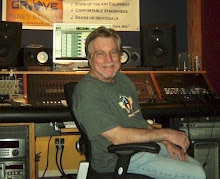
We’ve Only Just Begun...
In my last couple of blogs I told you how to prepare for and what to expect at your recording sessions. Let's say you've carried that out. You’ve laid down tracks of guitars, bass, drums, keyboards, percussion, vocals, and/or background vocals. You ask the engineer to play back a rough mix of what you’ve done. You’re proud of your work and you go home exhausted but exhilarated. Congratulations, you have completed the recording portion of the process. But the job is not over yet; the engineer’s work is far from finished. He’ll be spending many more hours refining your tracks and making them special.
Editing.
The next step in the process is editing. For many of my Groove Tunes customers who haven't done a lot of recording, editing can be the most important part of the process. Sloppy performances can be tightened up and made to sound really professional. Remember all those “takes” you recorded? I listen carefully to all those takes again and again and I find and assemble all the best parts. I digitally cut, copy, and paste various sections of the recording, make timing alignments, edit out unwanted noises, and perform pitch corrections if necessary. This process can be likened to the editing process of movie production, where much of the filmed (recorded) action is left “on the cutting room floor”. In the final song edits, a high percentage of what was recorded is not used, and much of what is used is edited and cleaned up prior to final mixing. The editing process often takes as long as all the time spent on recording, and then some. So here's a simple hint on how to save money: Make sure you know your parts before you come in to record them. The tighter the performance, the less editing I will have to do, and that will save you bucks.
Mixing.
Mixing is the next step, and in many cases, the final step in the process. Once I've finished editing all the tracks, getting everything cleaned up and on the beat (thanks to that click track), it’s time to decide how the final two-track mix will sound. The mixing process is where art-meets-science. Starting with perhaps dozens of tracks of recorded and edited material, my challenge now is to decide how to blend all these sounds into a pleasant stereo image that flows properly from start to finish. I will decide the relative volume of each track throughout the entire song, where each instrument will sit across the stereo left-right panorama, how to equalize (EQ) the treble and bass of each track, whether compression or limiting are applied and if so how much, and when to add sonic sweeteners such as delays, reverb, and other special effects. Mixing can take anywhere from two to six hours or more per song, depending on the complexity of the music and the overall project budget. I will typically work on a mix for a few hours in order to get a decent mix, then leave the project alone for a day, then come back later with fresh ears and take the mix to the next level of perfection. (At Groove Tunes Studios' ProTools HD digital recording system all mix settings can be saved and called back up automatically at a later date.) This procedure can be repeated over and over until I feel good about the mix and I'm ready to play back my creation for you.
In my next blog I will wrap up this series of blogs by talking about the final steps that take place. Now go practice that lead guitar part -- know it, live it, love it, so that when you come in to record it, you will play it!



